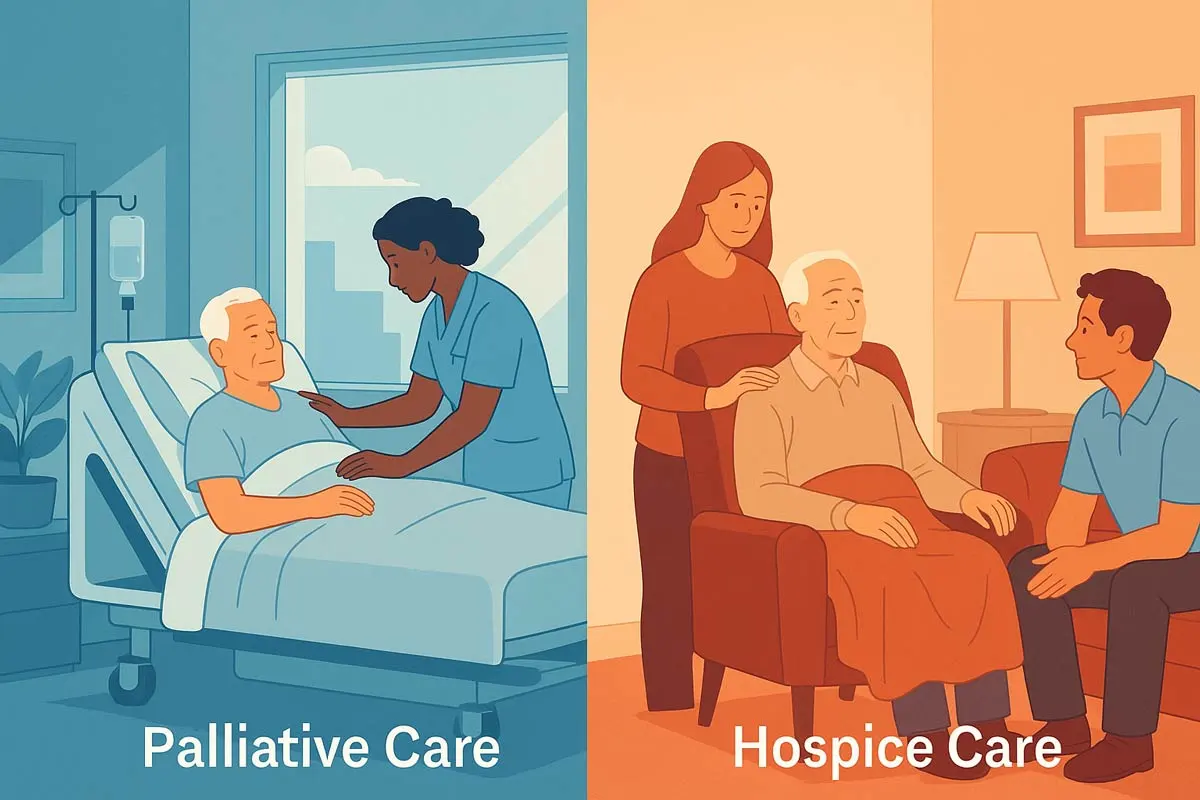
Hospice caregiver with patient and family in a warm home setting.
Table of contents
Show moreShow less- What Is Palliative Care?
- Goals of Palliative Care
- What Is Hospice Care?
- Goals of Hospice Care
- Key Differences Between Palliative and Hospice Care
- Who Can Benefit from Palliative Care?
- Who Can Benefit from Hospice Care?
- Common Misconceptions
- Services Offered in Palliative Care
- Services Offered in Hospice Care
- The Role of Family and Caregivers
- Insurance and Coverage
- How to Choose Between Palliative and Hospice Care
- Conclusion
- Frequently Asked Questions
Life-altering illnesses bring not only medical challenges but also emotional, mental, and spiritual struggles. At times like these, two vital forms of support emerge: palliative care and hospice care. Although often confused, these services are distinct from one another. Understanding them can help patients and families make informed, compassionate decisions.
What Is Palliative Care?
Palliative care is specialized medical care focused on relief from symptoms, pain, and stress associated with serious illnesses. It's not limited to end-of-life situations and can begin at any stage of disease, even during treatments aimed at a cure.
The care team typically comprises doctors, nurses, social workers, chaplains, and counselors—all working together to enhance overall well-being.
Discover more about our top-paying caregiver jobs in Philadelphia.
Goals of Palliative Care
- Pain and Symptom Relief: Managing discomfort from illness or treatment.
- Emotional and Spiritual Support: Helping patients cope with anxiety, depression, or fear.
- Quality of Life: Ensuring patients can enjoy daily life while undergoing treatment.
Think of palliative care as a supportive partner walking alongside traditional medicine.
What Is Hospice Care?
Hospice care begins when treatments are no longer aimed at curing the illness and the focus shifts to comfort, dignity, and peace. Typically recommended when a patient has six months or less to live, hospice care provides support wherever the patient calls home—whether it's a house, nursing facility, or hospice center.

Palliative care focuses on supportive treatment in a hospital, while hospice care emphasizes comfort and family support at home.
Goals of Hospice Care
- Comfort Over Cure: Managing symptoms rather than fighting the disease.
- Holistic Care: Addressing physical, emotional, and spiritual needs.
- Family Support: Offering counseling, education, and bereavement services.
Hospice ensures that no one faces the end of life alone.
Key Differences Between Palliative and Hospice Care
| Aspect | Palliative Care | Hospice Care |
|---|---|---|
| Timing | Any stage of illness | Last 6 months of life |
| Treatment | Works with curative treatments | Focus only on comfort, no curative intent |
| Eligibility | Anyone with a serious illness | Terminal illness with limited prognosis |
Who Can Benefit from Palliative Care?
- People with chronic illnesses such as cancer, heart failure, or kidney disease.
- Patients are still receiving chemotherapy, dialysis, or surgeries.
- Families seeking guidance and emotional support during uncertain times may also explore the advantages of in-home care for seniors to provide additional comfort and stability.
Who Can Benefit from Hospice Care?
- Individuals with a life expectancy of six months or less.
- Families preparing for the end of life and seeking comfort-centered care.
- Patients wishing to avoid aggressive interventions and focus on dignity.
Common Misconceptions
- Palliative care is not just for dying patients. It can begin early.
- Hospice care does not mean giving up. It means shifting priorities.
- Both approaches focus on dignity, respect, and relief.
Services Offered in Palliative Care
- Pain management programs
- Nutritional guidance
- Counseling for patients and families
- Coordination with other treatments
Services Offered in Hospice Care
- 24/7 nursing availability
- Emotional and spiritual counseling
- Medication and medical supplies for comfort
- Bereavement support for families
The Role of Family and Caregivers
Family members often serve as the backbone of care, and many choose to become a caregiver for a family member to provide consistent and compassionate support. Palliative and hospice services assist them by offering:
- Education about medications and daily care
- Emotional counseling and respite care
- Support in making difficult decisions
Insurance and Coverage
Medicare, Medicaid, and private insurance cover most hospice care in the U.S.. Palliative care coverage varies depending on the insurance plan, but many services are typically included, especially when recommended by a physician.
How to Choose Between Palliative and Hospice Care
- Discuss with Doctors: Open conversations clarify options, and resources such as how to qualify for home health care can guide families in making informed decisions.
- Evaluate Goals: Is the aim to continue treatment or focus solely on comfort and quality of life?
- Recognize Timing: Hospice may be best when curative treatments no longer offer benefit.
Conclusion
Both palliative and hospice care are designed to help patients live with comfort, dignity, and peace during serious illness. Choosing the right type of care is not about giving up—it is about embracing compassion and quality of life. Families and patients who seek support early often find the journey less overwhelming and more meaningful, especially when they choose to transform life with personal care services that prioritize dignity and independence.
Looking for palliative or hospice care in Philadelphia? Contact Supreme Homecare today to learn how our compassionate team supports families and helps loved ones live safely, comfortably, and with dignity at home.



